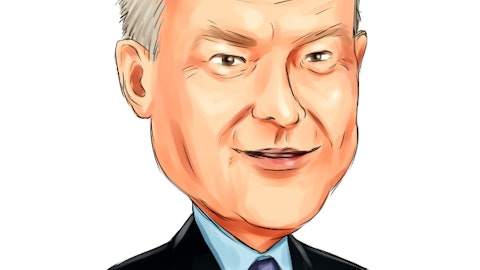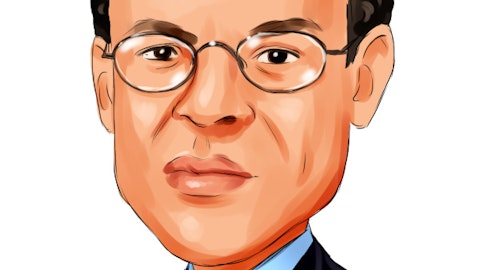Jason Tyler: Sure, so on loan demand, I always remind people, it’s super spiky. On the base of business we have and the clients that we have that can come with really significant asks, and we’re happy to do it because a lot of times, they’ve got potentially billions of dollars in assets, and then they might have a liquidity need and they don’t want to liquidate the asset, it’s a great opportunity for us to help them at very large dollar amounts, it solidifies relationships well. We just don’t look quarter to quarter at loan volumes as much as I think it’s appropriate to for other institutions. In general, our growth expectations are for more of a business-as-usual growth rate. We do anticipate some growth this year in the business, not a ton but more business-as-usual.
Then on capital, there’s no problem we’re trying to fix in mix or scale. Frankly in capability, we’re just thinking opportunistically. If things come up, we’ve got the capital to be able to look at it. We’ve talked about having more of a bias at this point towards wealth management. We’ve done some things from an acquisition perspective in asset servicing over the last several years – they’ve gone well, but we’ve got a whole product circle there that we feel good about than we do in wealth, but the more we can bring on attractive wealth clients that don’t necessarily have the holistic product approach that we can bring, it’s a great opportunity for us to create value, and so that’d be top of the list, but no problems we’re looking to solve from a mix or scale perspective.
Mike Brown: Okay, very interesting. Thank you for taking my questions.
Operator: Thank you, and we’ll go to our last question from Brian Bedell from Deutsche Bank.
Brian Bedell: Great, thanks for taking my follow-up. Maybe to switch gears a little bit, just on the wealth side, to what extent are you seeing any impact from some of your entrepreneur clients that may have had lower valuations in their private businesses, or in their public businesses? Are you seeing any kind of pullback from those clients? Is it significant or is it really just not that big a deal?
Michael O’Grady: Brian, it’s Mike. I would say we definitely are seeing a different perspective on the part of the clients that you’re talking about, or prospects, right? I mean, a lot of the activity in 2021, beginning of 2022 was as a result of business owners who were selling their businesses, were monetizing assets, and so that was an uplift for us. With the reduced activity that you’re seeing of IPOs and market activity there, but then also certainly in the private marketplace lower activity there, definitely it’s had an impact for us of just less market opportunity for us.
Brian Bedell: Okay, thanks, and then just one more on expenses – a lot’s been asked and answered, but just in terms of the on-boarding for the asset servicing pipeline, should we expect what is typically in the business, where you have some on-boarding expenses ahead of when the contracts are installed and generating revenue? Is that something also that might create some noise for 2023, given the 4Q larger, chunky mandate that I think you’re bringing on?
Jason Tyler: Yes, a couple things. One, nothing that we’d call out at this point. If that changes, we’d call it out for you. In some instances, even, some of those expenses are capitalized in long term contracts, and so–but nothing at this point that we’d want you to be thinking ahead on.
Brian Bedell: Okay, great. Thank you so much for taking my follow-ups.
Operator: We will now turn it back to our speakers for any closing remarks.
Jennifer Childe: Thanks very much for joining us today. We look forward to speaking with you again soon.
Operator: Thank you. Ladies and gentlemen, that does conclude today’s conference. We appreciate your participation. Have a wonderful day.
Follow Northern Trust Corp (NASDAQ:NTRS)
Follow Northern Trust Corp (NASDAQ:NTRS)
Receive real-time insider trading and news alerts




